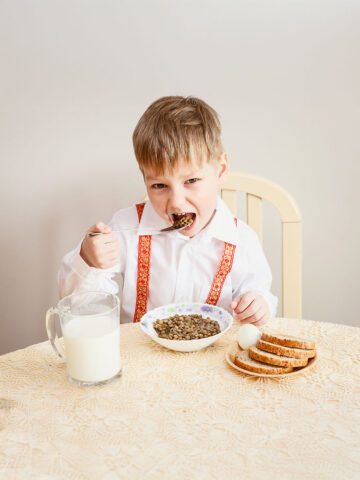By: Dr. Meredith Dennis, pediatric psychologist at CHOC
The holiday season can be a very busy time for everyone. While the holidays are fun and exciting for many, they can also bring a unique set of challenges for both adults and children. This is especially true for kids when it comes to changes in routines and daily activities. Whether it be attending a holiday gathering, being on school break, having a full agenda of activities or simply having more downtime than usual, changes in routine can be difficult for children to cope with. Sometimes simply not having anything to do can lead to feelings of boredom.
Similarly, having out-of-routine events to attend and constantly being on the go with holiday festivities can be overwhelming for kids. These types of situations can lead to children experiencing difficult feelings and emotions, which can lead to undesired behaviors.
Undesired behaviors may be a means of communication from your child
It may be helpful to keep in mind that while behaviors such as tantrums, defiance and back-talking are undesired and may create negative feelings for caregivers, they are often a means of communication for your child. Your child may be trying to tell you that they need something to keep them engaged, that they don’t want to do something, or that they have had enough of a particular task or activity.
No matter the reason behind them or what kind of behaviors you child engages in, it can be stressful as a caregiver when your child throws a tantrum, does not comply with your directions or even becomes aggressive. Dealing with behavior challenges in public or in a group setting can be especially overwhelming because no one wants to be put on stage to perform their parenting skills for everyone!
How to manage your child’s behavior during the holiday season
Though we cannot always prevent behaviors from happening altogether, there are ways we can reduce the chances that your child will act out or keep the behavior from getting worse!
Stick to a routine as much as possible
Maintaining predictability during the day can help your child build structure and have a sense of security. Even though your daily routine may look different during the holidays, there are things that you can stick to (e.g., awake times, hygiene routines, bedtime activities, play time) that can help with consistency.
Involving your child in creating a schedule for the holiday break can also help increase engagement in activities and feelings of accomplishment and self-confidence, which directly reduces more difficult feelings like anxiety about what’s coming next.
When your child knows what to expect, they may be less likely to engage in behaviors you don’t want. Be sure to build breaks and fun activities into the day to reduce stress and increase positive feelings. Schedule or have your child earn rewards or give praise for successful transitions and completion of activities.
Offer choices
While your child may not have a choice in some of the things you have to do or events you must attend, you can increase the control your child feels by offering choices. For example, if you have to run errands with your child (often not a preferred task for kids) and need to go to multiple places, you can offer a choice of where they would like to go first (e.g., “Would you like to go to post office first, or the grocery store?”).
Another example includes offering choices of foods your child can choose to eat. Remember, you as the caregiver ultimately control what choices are being offered in the first place, but your child gets to choose between the options being presented to them. Offering choices may help your child feel that they have some control over their lives, which can lead to a decrease in acting out behaviors.
Give rewards
One way to help your child engage in desired behaviors is to offer lots of praise and rewards for good behavior! Did your child transition successfully from one holiday gathering to another? Did they say thank you for the gift they received from grandma? Give them some praise (e.g., “I am so proud of you for using your manners and saying thank you to grandma!”). Do you want your child to make it through some holiday shopping while listening, following directions, staying with you, using their inside voice and not asking for everything under the sun? Sounds like a dream, right?
You can help set expectations for your outings by offering a reward for desired behavior (e.g., “If you stay with me, look with your eyes and not your hands and use your inside voice while we are in the store, you can pick out a candy”). Remember to be as clear as possible about how the child will earn the reward and only provide the reward if your child meets the expectations. You also have control over what you are willing to offer for a reward. Bonus points if you offer a choice (between two things of your choosing) here to increase motivation and buy-in from your child!
Stay calm
If your child does start to act out, take a deep breath! If you maintain your composure, use a calm voice, and respond to your child in a non-defensive manner, your child may be more likely to stay calm as well. Using validating statements that acknowledge how your child is feeling and assisting them with naming their emotions can help (e.g., “I see that you are very angry right now because you want to go home and play with your new toys. It’s hard not being at home with all your fun things”).
Do fun things and get creative!
If your child has too much downtime, there are many activities you can do at home and in the community to stay occupied! Below is a list of activities that can help reduce boredom and provide entertainment for your child:
- Do a scavenger hunt or build a fort (in the house or outside!).
- Make a holiday ornament or craft.
- Record a music video or a movie.
- Go on an outing to a new place.
- Have themed dress-up days.
- Write a letter or draw a picture for someone and mail it to them.
- Set up a video call with a friend where you do a chosen activity together or have a playdate.
- Do a puppet show.
- Make up a dance.
- Set up a camp-out or picnic in the backyard.
- Re-decorate or re-arrange your room or favorite space.
- Make a tangible item that will help your child regulate their emotions such as a “calm down bottle” or a “worry jar,” slime or a poster/vision board of favorite things.
The holiday break is also a great time to learn a new skill or activity as well — learn to cook, bake, or make a favorite snack, play an instrument, try a new game or sport, plant something and help it grow, teach your child tohelp take care of your pet, make a bracelet/jewelry, learn a new language or all about a new topic.
Bonus tip: Make a “menu” of fun activities to help your child feel inspired in case they get stuck.
Prepare in advance for the return to school
Transitioning back to school after the holiday season can be tough. Help your child get ready for the transition back to school by anticipating the challenges that may arise. Start preparing a few days ahead of time by talking to your child and giving them a heads up that school is coming.
Help your child cope ahead by having some skills they can use to stay calm if they get nervous about going back to school (e.g., taking deep breaths, asking for a break, getting a drink of water, having a comfort object they can keep in their backpack or pocket). Remember to use your routines here, too! Be sure to give yourself extra time in the morning in case there are challenges. It is easier to stay calm if you yourself are not feeling the pressure of having to get out the door right this very minute when your child is having a meltdown!
Remember, you can always reach out to the school for help if your child is struggling to attend school. Coming back to school after a long break is difficult for many children, and the staff at your school may have some additional tips or insight that would help you help your child with the transition. Finally, it may be helpful to plan some extra special activities for the first week or so to reward your child for being successful in attending school. This will increase your child’s motivation to return to school and make it a more rewarding experience for everyone!
Navigating the holidays with children who engage in challenging behaviors can be tough, but with some preparation and behavior management techniques, you can turn a stressful season into a successful season!
Get more expert health advice delivered to your inbox monthly by subscribing to the KidsHealth newsletter here.
Get mental health resources from CHOC pediatric experts
The mental health team at CHOC curated the following resources on mental health topics common to kids and teens, such as depression, anxiety, suicide prevention and more.





